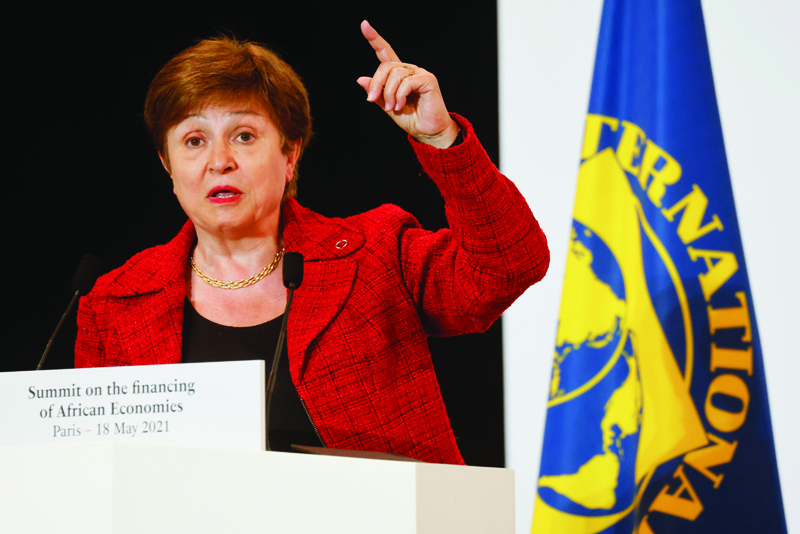 PARIS: International Monetary Fund (IMF) Managing Director Kristalina Georgieva speaks during a joint press conference at the end of the Summit on the Financing of African Economies in Paris. - AFP
PARIS: International Monetary Fund (IMF) Managing Director Kristalina Georgieva speaks during a joint press conference at the end of the Summit on the Financing of African Economies in Paris. - AFPWASHINGTON: The new Omicron variant of COVID-19 could slow the global economic recovery, just as the Delta strain did, IMF chief Kristalina Georgieva said Friday. "A new variant that may spread very rapidly can dent confidence and in that sense, we are likely to see some downgrades of our October projections for global growth," she said at a Reuters event.
In its most recent World Economic Outlook, the fund projected global growth of 5.9 percent this year and 4.9 percent in 2022, but the United States and other major economies suffered sharp downward revisions after the spread of the Delta variant "caused some friction," Georgieva said. "Even before the arrival of this new variant, we were concerned that the recovery, while it continues, is losing somewhat momentum," the IMF chief said, noting that policymakers are now dealing with new issues like inflation.
The IMF's most-recent forecasts raised concerns that global supply chain issues and uneven distribution of vaccines were slowing the rebound, and causing some countries to be left behind. A surge in demand in many advanced economies coupled with shortages of key components like semiconductors has fueled a wave of prices increases.
Less than two months ago, Georgieva expressed confidence that inflation would not become a "runaway train" but on Friday she said the US Federal Reserve will have to increase interest rates in 2022, rather than in 2023, as the IMF previously predicted. The Fed, which cut the benchmark lending rate to zero in the early days of the pandemic, already has started to pull back on its stimulus measures and has signaled it will speed up that process, which would put it in position to lift rates off zero by midyear.
"We do believe that the path to policy rate increases may be walked faster," Georgieva said. With the recent wave of price increases likely to remain a concern for some time, the US Federal Reserve should raise interest rates sooner, the IMF said Friday. It was an unusually direct policy recommendation from the Washington-based crisis lender that comes as surging demand coupled with supply bottlenecks and shortages of key materials like semiconductors has driven US consumer inflation to its highest level in three decades.
The Fed already has signaled that it will remove stimulus measures more quickly, opening the door to a rise in lending rates before mid-2022. Many economists now expect two or three interest rate increases next year. "Inflation is likely to be higher for longer than previously thought," especially in economies that have recovered faster from the pandemic like the United States, IMF chief economist Gita Gopinath and Tobias Adrian, director of the IMF's Monetary and Capital Markets Department, said in a blog.
With the US economy recovering strongly from the pandemic and facing tight labor markets and broad price increases, "It would be appropriate for the Federal Reserve to accelerate the taper of asset purchases and bring forward the path for policy rate increases." The Fed last month began to slow its monthly bond buying program put in place to shore up the financial system at the start of the pandemic, when it slashed the benchmark borrowing rate to zero. Fed Chair Jerome Powell earlier this week said he would advocate ending the bond buying more quickly, which would mean the bank would be in position to hike rates in the first half of next year.
The IMF officials said central bankers should continue to telegraph their moves in advance to prevent surprising markets and sparking a wave of volatility. It is "essential for major central banks to carefully communicate their policy actions so as not to trigger a market panic that would have deleterious effects not just at home but also abroad," they said.
Given the "sharply higher uncertainty associated with Omicron," the newest Covid-19 variant, policymakers will need to watch data closely, since another outbreak could exacerbate supply snags, they said. However, they continue to believe the "mismatch in supply and demand" will ease over time, "Reducing some price pressures in countries." "Shipping delays, delivery lags and semiconductor shortages will likely improve in the second half of 2022" and demand will ease as the effects of government stimulus retreats, they forecast. - AFP










